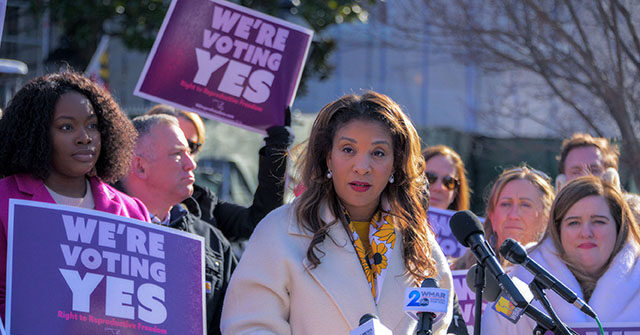Maryland is already one of nine states, as well as Washington, DC, that have no restrictions on abortion, meaning babies can be legally aborted throughout pregnancy. In November, a proposed amendment would additionally enshrine the right to abortion throughout pregnancy into the state’s constitution.
If a simple majority of voters approve the measure, Maryland’s status as a haven for unlimited abortions will be permanent, save for another vote of the people through a future ballot measure or some lengthy legal battle.
Maryland lawmakers voted in March of 2023 to place an abortion ballot measure in front of voters in November of 2024.
The proposed amendment, which will appear as Question 1, states:
That every person, as a central component of an individual’s rights to liberty and equality, has the fundamental right to reproductive freedom, including but not limited to the ability to make and effectuate decisions to prevent, continue, or end one’s own pregnancy. The state may not, directly or indirectly, deny, burden, or abridge the right unless justified by a compelling state interest achieved by the least restrictive means.
Ballot measures are particularly effective as an offensive weapon because they are basically irreversible. They change a state constitution, take precedence over laws passed by state legislatures, and can only be overturned by another ballot measure or lengthy legal battles. The measures are typically propped up by left-wing organizations and affiliates with deep pockets — such as Planned Parenthood and the ACLU, out-of-state dark money groups, and billionaires with eugenicist leanings — often outspending pro-life organizations by double or triple.
Every single pro-abortion-related ballot measure since the fall of Roe has been successful. During the 2022 special elections, Kansans rejected a ballot measure that would have established that the state Constitution does not include a right to abortion. During the 2022 midterms, voters in California, Michigan, and Vermont codified abortion into their Constitutions. At the same time, voters in Montana rejected a ballot measure that would have given rights to babies born alive in botched abortions. Voters in Kentucky also rejected an amendment similar to the one in Kansas. Last November, Ohioans also voted to codify the supposed right to abortion in their state Constitution via Issue 1.
Abortion is on the ballot in ten states this fall, including Colorado — another of the nine states that has no gestational restrictions on abortion.
READ MORE: These Ten States Have Abortion on the Ballot in November
Left-leaning, pro-abortion media outlets often downplay abortions performed late in pregnancy and babies who are born alive in botched abortions, sometimes by outright denial.
While there are not many abortion clinics that perform late-term abortions, Abortion Finder, a pro-abortion resource backed by Planned Parenthood and the National Abortion Federation, estimates that there are as many as eight that perform abortions after 28 weeks.
One is located in Maryland and allegedly performs abortions at up to 35 weeks and six days — approximately a day short of being considered the beginning of the ninth month of pregnancy.
READ MORE: Media Admit Babies Are Aborted Weeks Before Birth Because They Are ‘Unwanted’
Thousands of unborn babies are killed in abortions after 21 weeks of pregnancy every year in the United States. The media frames the loss of thousands of unborn lives as rare because late-term abortions make up a small percentage of abortions overall.
For example, there were 625,978 legal induced abortions recorded by the Centers for Disease Control and Prevention (CDC) in 2021. One percent of those were after 21 weeks, which is more than 6,000 post-viability babies killed in abortions. The pro-abortion Guttmacher institute estimated that more than one million abortions were performed in 2023, which by CDC estimates could mean at least 10,000 late-term abortions were performed that year.
There is disagreement on what the term “late-term abortion” actually means. Pro-abortion organizations often reject the term and say the official medical definition of “late-term” would mean 41 weeks, or past full-term. The pro-life Charlotte Lozier Institute has called the definition of late-term abortion “imprecise and shifting,” but has generally defined it as abortion later in pregnancy, typically when babies can survive outside of the womb, “with instances of survival occurring at 22 weeks gestation or slightly earlier.”
Katherine Hamilton is a political reporter for Breitbart News. You can follow her on X @thekat_hamilton.



